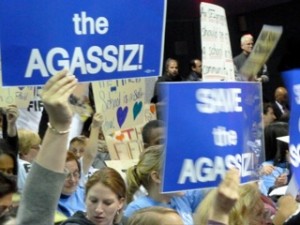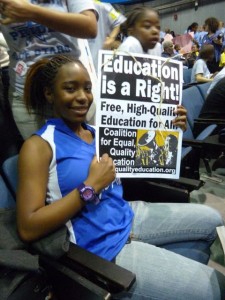By Jacqueline King and Ann O’Halloran

Hundreds of parents, teachers and students protested school closures at the Dec. 15 Boston School Committee meeting. (Photo by Ann O'Halloran)
Ignoring the passionate pleas and hard evidence presented by hundreds of students, parents and teachers this fall that their schools should remain open, the mayor-appointed School Committee voted unanimously on Dec. 15 to close, merge or allow charter takeovers of 20 Boston schools.
The crowd of hundreds repeatedly interrupted the meeting with chants of “Shame on you!” and “No vote to close schools!” but the members pressed on toward their approval of School Superintendent Carol Johnson’s so-called “Redesign and Reinvestment Proposal.” Many saw the hours-long meeting as a political show conducted by the school board with a foregone conclusion; calls for a return to an elected School Committee, whose members could be held accountable, were met with wild applause. Some people wept as they left the auditorium of English High School; others expressed outrage.
“The School Committee did not listen to the pleas, cries, outbursts, and suggestions by parents, teachers, supporters, and students,” Bryan Moore, a student at Excel High School, said the day after the vote. “The words of the community seem to have gone in one ear and out the other. What has happened to the once great school system I have come to know and appreciate?”
Johnson and Mayor Menino claim the closings and mergers are necessary to close a $63 million school budget gap. Yet they and the school board members repeatedly fail to connect the budget shortfall to the fact that Boston will lose an estimated $64 million to privately run charter schools this year, minus some short-term reimbursements. Meanwhile, 16 additional charter schools – some with little or no track record – are waiting in the wings, ready to take over shuttered public school buildings and drain more students and funds from the public schools.
Nor, apparently, has the mayor sought funds from other sources in the city budget or the private sector. When he met with the Chamber of Commerce the day before the vote, one might have thought the mayor would ask these wealthy businesses to step up to the plate and help out the schools. Instead, Menino was there to assure them that the budget crisis would be solved by closings and cutbacks. Yet private developers and corporations receive large tax breaks every year in Boston, such as the $50 million in city and state “blight” tax breaks Liberty Mutual was awarded earlier this year for its proposed tower in the prosperous Back Bay.
City Councilor Charles Yancey, one of the few elected officials to speak Wednesday night, told the committee, “We are going in the wrong direction!…We must stop balancing the budget on the backs of the schoolchildren! I urge you to vote no on the proposal – this is not a reinvestment, it’s a disinvestment!” (See Yancey’s press release calling for a reversal of the vote here.)

Jireh Wilfred, 17, said the school closings will harm children's lives, adding, "The struggle continues!"
Many who spoke in the hours of public testimony described the harmful impact the school closings could have on children’s lives and the surrounding communities. Jireh Wilfred, 17, whose sister teaches at the Emerson School, said, “You are destroying relationships! Can you live with the fact that you are destroying the futures of men- and women-to-be? They might go off, and sell drugs or join gangs or die! Even if this vote passes, we are not going away. The struggle continues!”
The closings and mergers will have a sharply unequal impact, falling most heavily on students of color, English language learners, students with special needs, and low-income areas of the city.
These disruptions are only the beginning of what’s in store for Boston. The School Department has announced that it intends to drastically change the student assignment plan to include more zones, in order to cut bus routes and transportation costs. It also intends to demand significant concessions from teachers concerning health insurance, length of school day, and other measures. Sam Tyler, of the business-backed Boston Municipal Research Bureau, has said that more public schools will have to be closed in the next year or two.
Citizens for Public Schools stands with the students, parents, and teachers of Boston in opposing these school closings, mergers, cutbacks and contract concessions. The fight for the Boston Public Schools will continue in many forms in the months and years to come. Similar conflicts are occurring throughout the country, in suburban and rural, as well as inner-city systems.
In Massachusetts, we need a coordinated effort to change public school policy at the state level, since that is where policy is currently being determined. Legislation passed last January—the so-called Act Relative to the Achievement Gap—removed the cap on the number of charter schools in “underperforming districts” and reinforced the evaluation of schools according to MCAS scores. We need legislative reform to make progressive changes in funding for schools, reinstate the cap on charter schools, and reform the use of MCAS so that a single paper-and-pencil test is not used to justify the closing of schools. Ultimately, as Diane Ravitch said in her recent Boston appearance: This is a battle about the very existence of public schools.
____________________________________________________________________
Jacqueline King is a CPS Board Member and Co-Editor of The Backpack. Ann O’Halloran is a CPS Board Member and 2007 Massachusetts History Teacher of the Year.
 More on the Fight for Boston Public Schools
More on the Fight for Boston Public Schools
- City Councilor Charles Yancey’s press release calling for a reversal of the Boston School Committee vote.
- Click here for a list of all schools to be affected, the demographics of those schools, and click here for previous CPS coverage.
- Go to statements from parents, teachers and students at Boston School Committee meetings here.
- For a cogent analysis of the charter school agenda in Boston, read a post by “Jamaicaplainiac” titled The Real Charter School Agenda in Boston.
- Go to coverage of Boston in the Backpack newsletter, here.
- Gallery of photos from Boston meetings, here.
- Jim Horn of the Schools Matter blog has written a powerful report on the Dec. 15, 2010 Boston School Committee meeting. He writes, “The children in the audience last night also saw the promise of a democracy renewed in the strong, eloquent voices of their friends, teachers, parents, bus drivers, school helpers, and community activists, who are now galvanized by the decision of the Mayor, the Chamber of Commerce, and the corporate foundations to turn their backs on so many amazing school programs and committed teachers and energized parents.” Read the full piece here.
- Read a “Manifesto” co-authored by Joel Klein, Michelle Rhee and other “education leaders” and signed by Boston Superintendent Carol Johnson. The Manifesto says the way to fix schools is to, for example, “eliminate arcane rules such as ‘seat time,’ which requires a student to spend a specific amount of time in a classroom with a teacher rather than taking advantage of online lessons and other programs.” (Shortly after signing this manifesto, Joel Klein left his job as chancellor of New York City schools to work for an online education company owned by Rupert Murdoch.)
- Read a flyer from the Boston Teachers Union charging city leaders with meeting secretly on what to do with “surplus” school buildings slated for closing, here.[To return to The Backpack, close browser page.]

